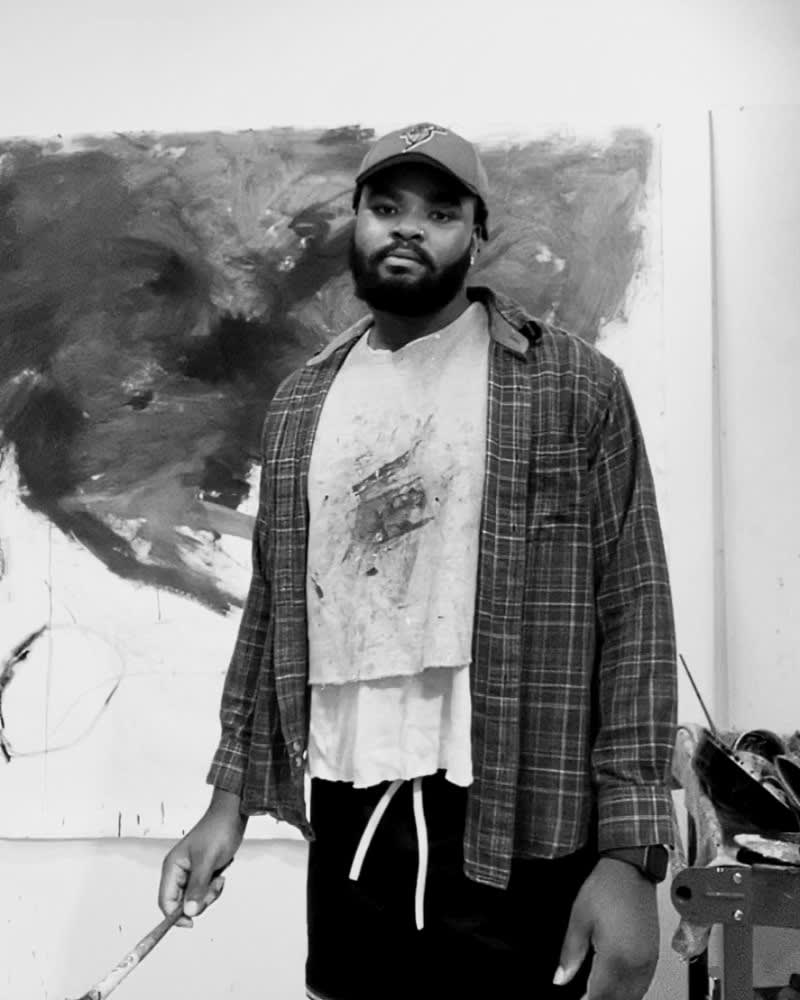
Thank you for having me here! You know, there are so many interviews with artists, where they are talking about their first encounter with art, and they say something like: “I knew that I would like to become an artist when I was three”. This is cool, however for me it wasn’t the case. When I grew up art wasn’t available to me. Nobody in my family could paint, so it was like a foreign language for me. On the other hand, to some extent I was interested in art, because I did Theatre in the high school. And I even wanted to become a fashion designer! As for my first encounter with art, I do remember doing watercolors in the third grade, but it wasn’t anything crazy. I mean, I always knew that I had this creative part of me, I just didn’t have the available resources. And when I went to college, a whole new world opened up to me. The year 2015 was the genesis – I started wanting to pursue art more seriously. At that time, I came across a documentary about Jean-Michel Basquiat. It was my introduction to the art world. Now Basquiat is everywhere, but back then, in 2013, just learning about him and understanding how he rose to the top, meant a lot to me. It was great to figure out, if it would be possible for me as well. So that was really the point when I understood that I would like to become an artist.
You are based in New York, the “heart” of contemporary art. But you were born in Boston and spent your college years in Worcester, MA. What was the key reason for you to settle down in New York? Did you plan it from the very beginning? And do you already feel yourself part of the local art community?
I am from Boston and have spent almost my whole life there. Then I started school at Worcester, the second largest town in Massachusetts after Boston, which is about an hour away. I just wanted to be far away from home but at the same time to stay close. Actually, I could have gone to school in New York City, but I wasn’t really thinking about art that early on. Art began for me the following years. As I have mentioned, 2015 was the year when I started taking art seriously. Despite that I have always wanted to live in New York City. Therefore, when I finished my undergraduate degree, I wanted to find a way to go to New York. It took a bit of time, but I am here now. The art community in New York is crucial. As I am still on my MFA program, I am kind of in my own circle, but now I am starting to meet other artists, which was actually the reason why I came to New York. My professor once told me, that your community is where you went to school. So, at first I found my art community in Boston, but then COVID-19 began. I am familiar with the East Coast, that’s why for me moving from Boston to New York didn’t make any big differences. It definitely feels a lot of faster here, which perfectly fits my lifestyle. So, it was a comfortable jump for me. I love New York, as it is a great place to be especially for the artist. There is so much more going on here, especially in comparison to Boston, where the art scene is limited to one local area, where all the galleries are. In New York the galleries are literally everywhere, the shows are happening all the time and that excites me. There is definitely more to see here, more information that I can get to myself. If there were only one word to describe New York, that would be accessibility – everything is just available for you.
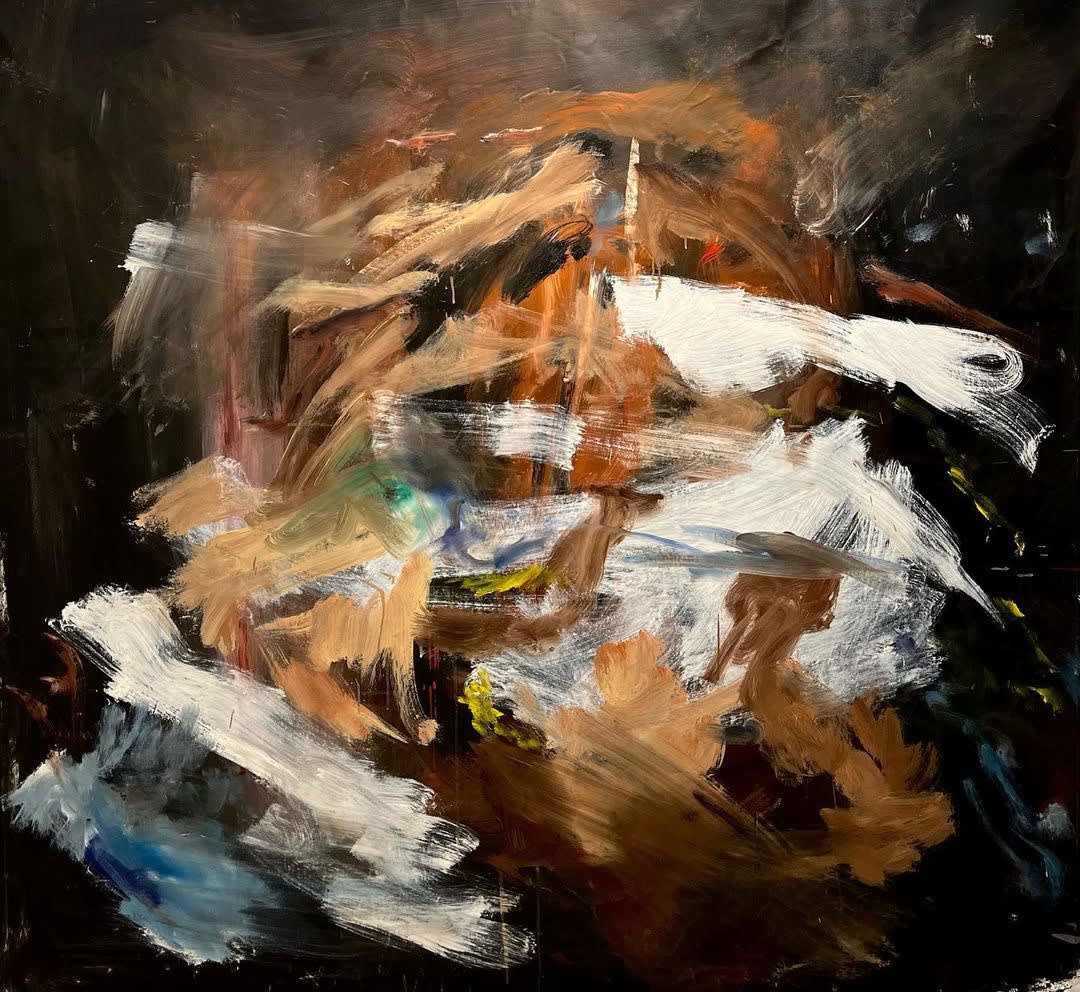
© Demetrius Wilson's Instagram, Tipping the Raft, 2022. Image: Demetrius Wilson
Looking at your works one can't help but notice that your art has made a dramatic shift – from figurative to abstract. Could you please explain to us, how and when it happened? What was the pivotal moment that caused this incredible transition?
I think it was just a natural progression for me. During my undergraduate degree I was working on fine arts, like portraits, because I was trying to understand the fundamentals of art. Again, my undergraduate program was the first time when I started painting. I was testing my own skills. And when I completed my undergraduate program, it gave me the sense of freedom. Previously I had to work on the academic structure, but even at that time I knew that I wanted to paint a little bit looser. So as for my early works, it is figurative art, but a looser one. And when I started my MFA program, it just clicked inside of me. My figurative works were a bit didactic, I felt like I was giving away too much, and not allowing the viewer to have their own entry points and to create their own interpretations. That has really changed when I started doing abstract works. Even if they are not figurative as they used to be, I do feel that they are still figural, because I am still dealing with the body, so they are suggesting body parts in movement. They are still very figurative, they are just breaking down a lot of things in them.
In the past you have worked a lot with social-historical context, criticizing corruption, racism, plantation owners, to name a few examples. Could you explain to us, what are the key topics and ideas you are currently dealing with?
The social-historical context is still there. But when I am dealing with these topics, I just want them to have a mediate relevance within my work. I got to the point where I have understood that I really do not have to articulate it in this way anymore. Because initially a lot of works are political, especially the works of Black artists. I think that is what people tend to assume from the works. And I just felt that I needed to add a little bit of me into the works and not just commenting on the things that are going on in the world. I think that there is a balance now. I could have definitely incorporated those social-historical topics, but I also need to see how they resonate with me. There is no doubt that I am creating the works to be distributed in the world, but at the end of the day they all are kind of around me. I don’t want to be narcissistic, I know that I have an audience, but the audience appreciate my works, because it is the art about me and how it is relevant to me. Hopefully, it is also relevant to the others.
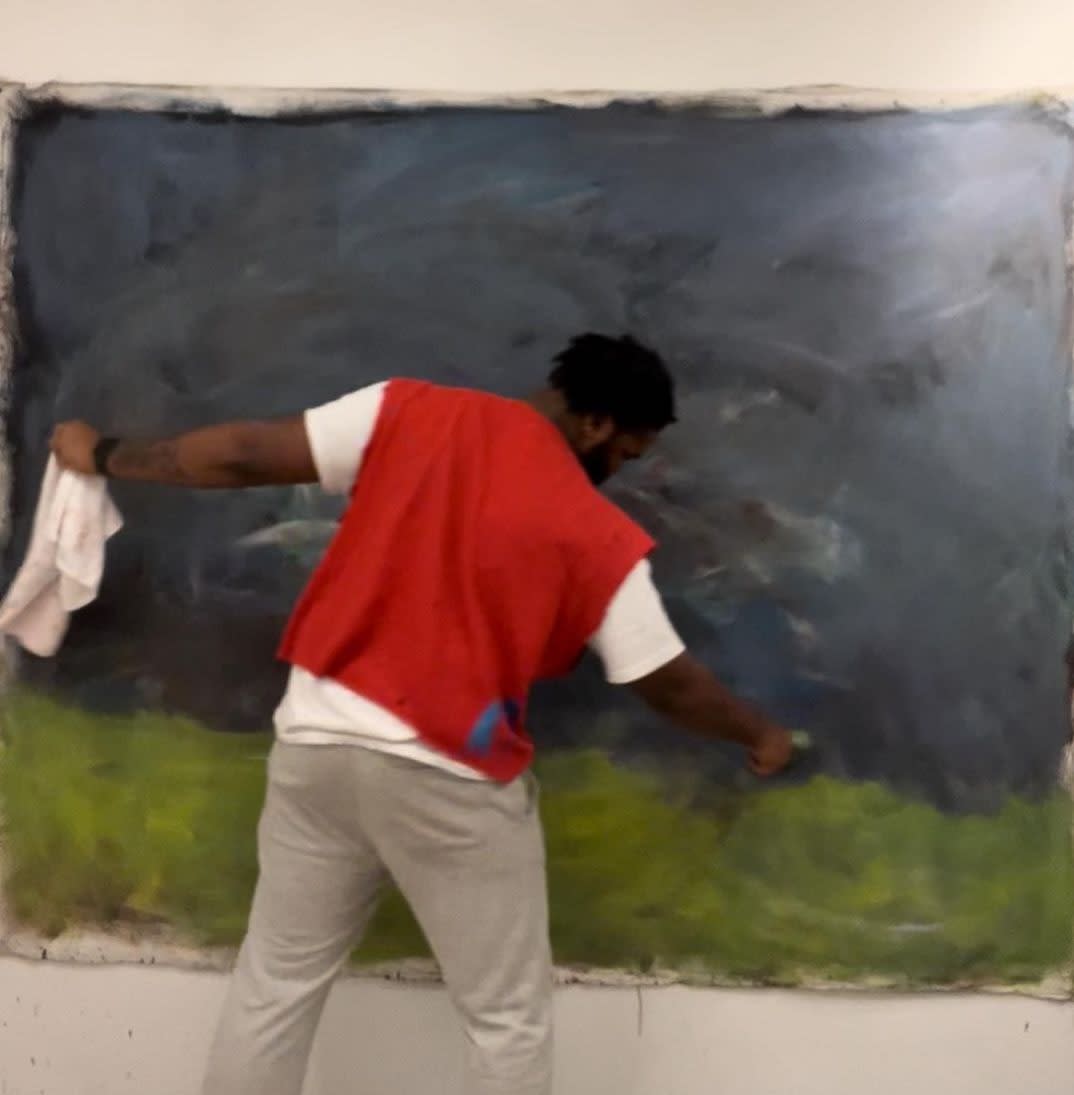
© Demetrius Wilson in the Studio. Image: Demetrius Wilson
That’s very interesting indeed. Another thing that struck me was that your art used to be extremely personal – via visual symbols you were sharing the stories of your parents’ backgrounds, including “dark” sides. At first I thought that in your current abstract works these messages are not so transparent because the works are not as personal anymore. But it looks like it isn’t really the case, is it?
I was using narratives from my past that I liked to discuss. However, there were a lot of vulnerabilities among them. I told a lot about my upbringing, for instance, but now I am much less focused on the narratives. I have just found a whole bunch of new motives and ideas and allowed those to create something completely new. My art is personal, as you have fairly mentioned, but I think, that the difference between my old and my new body of works is that the previous works were more vulnerable. That is probably the most distinguishing difference between them. And also the environment, the surrounding does affect a lot on my art. In Boston, the community that I was in, was more limited. But know, being in New York, there is just so much more surrounding me. There is a lot more influence, a lot more things that I can take from and insert them into my works. Besides, though I don’t watch the news, I am aware of all the things that are going on – both in the community and in the world and how crazy the world is. I think, that influences my work as well. So, the environment and the context are very important, especially for abstract works. Therefore New York, and its new environment that is surrounding me now, has affected my art – both directly and indirectly. When people look at my work they normally say, that there is energy in it. And I feel that my voice has energy. But previously, in Boston, I felt that, this energy was more contained. And in New York the things are much more open, much faster, there is a lot going on at one time. And it definitely influences the works, whether I am happy about it or not, it just happens, which is beautiful in the very end of course.
Your color pallete combines bright vivid colors with tones of darkness. How do you go about making these decisions about color and tone within your work?
Colors are crucially important for my works. I like colors so much! And remember, I wanted to be a fashion designer, so am kind of fascinated by putting different pieces together, trying different things, even if you wouldn’t been thinking of them as the most suitable relationships. I am very interested in color relationships because they do tell one story about the person, but also the context of other things. Again – my environment influences my colors. I wouldn’t label myself as a color theorist, like somebody who is really enjoying colors and patterns. Actually, it is a very risky adventure when playing with colors. You put this and I am more like “How can I make something ugly more beautiful”? And that is how I approach colors.
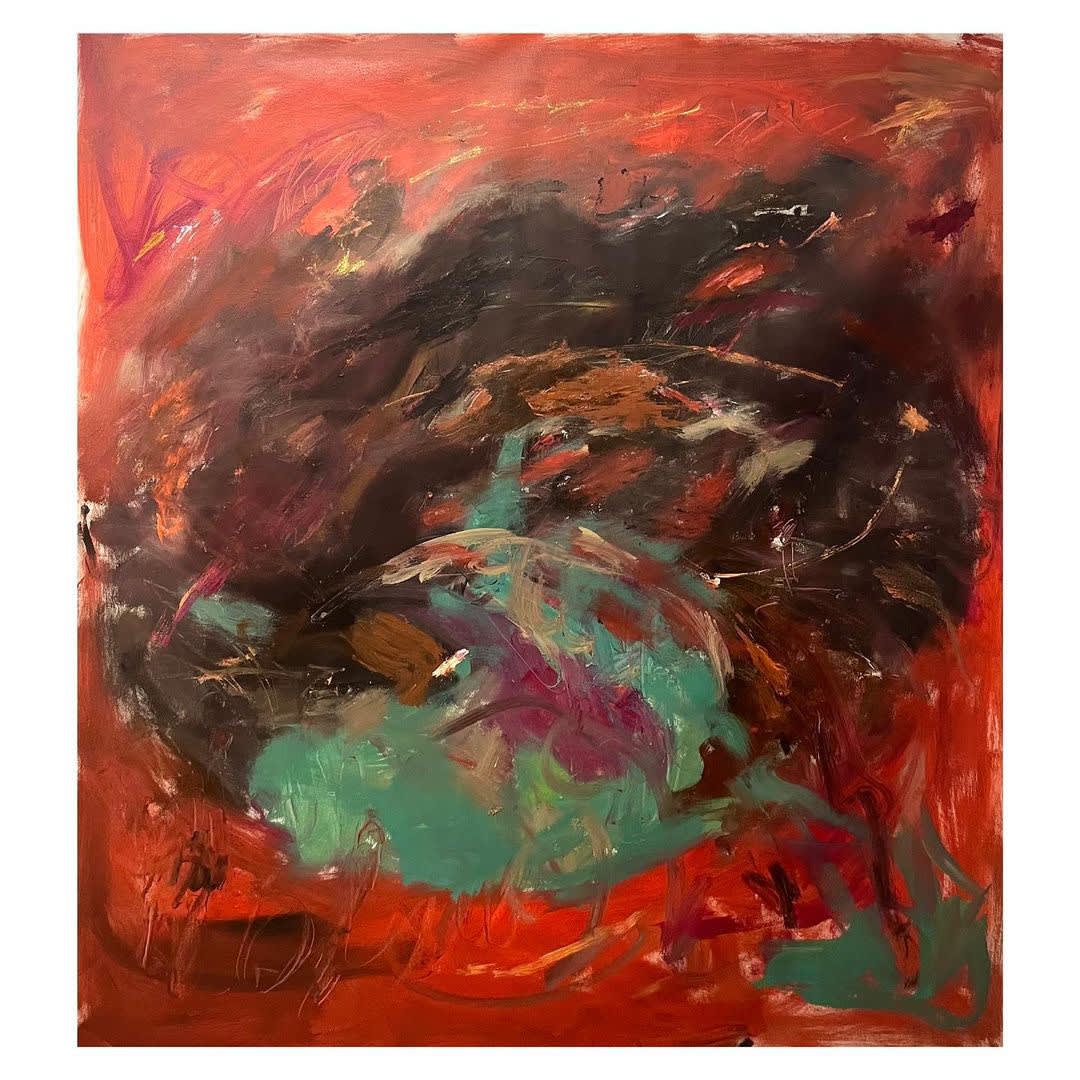 © Demetrius Wilson's Instagram, The Smog Creeps Up on You, 2022. Image: Demetrius Wilson
© Demetrius Wilson's Instagram, The Smog Creeps Up on You, 2022. Image: Demetrius Wilson
Speaking about the technical side: Do you prefer working with sketches and have the vision of a painting before you start, or you just go directly to the canvas and begin experimenting with paint layers and mixing colors?
It is funny because in undergraduate studies my professors explained to me how to do preliminary sketches for the bigger works. And it just didn’t work for me. I think when I was working a little bit more figuratively, especially if you want something to look realistic, you have to do sketches. But with my current works I don’t really do any preliminary drawings. I do draw a lot, but I do not divide my drawing and my painting. I do not see here a “hierarchy”, therefore I don’t look at drawing as at something “preliminary”. Drawing and painting are completely different things for me. But back to your question – it’s relative. I do not sketch normally; I do go directly to the canvas and start working - at first I drop down this color and then another and I observe how they react. That is how my entire work looks like – I react on that is in front of me. And it really works best for me.
How does your creative process look like? Are you listening to the music while working in the studio? I am very curious to find out some backstage details!
I love music! I am not a musician of cource, but I think that music adds a little bit more to my works. And for me if I am in the studio, I can be really productive, and music plays a huge part of it. I have just started listen to podcasts as well – finally. I like listening to music and watching documentaries, but sometimes I don’t feel like I want to sit down and watch something. So, instead I am listening to a podcast while I am working. Comparing music and podcasts, when I am listening to music, I am a little bit more lost in thoughts. I am not really thinking that much, but I am in this flow. I am just working and reacting. And while I am listening to a podcast, I am listening both to the podcast and to the works. I am a little bit more attentive. There is still that energy, but I am slowing it down. And what I have learned over these past few months is that sometimes I work too fast. I just need to slow down and to see what the work “breathes” and what is going on on the canvas. I am currently working on five large-scale paintings at the same time. And I do this because I like when the works “talk” to each other – directly and indirectly. I like having similar colors in them. Besides, if I work on one piece too long, if I hyperfocus on it too long, I feel like I am going to mess it up. So that is why I need to disperse my attention to other pieces. That allows me to give them space. I do take a bit of the time and give the works a little bit of “breathe”.
What are your main sources of inspiration? Any hobbies or activities that play a part in your practice?
Well, I write some poems. Besides, I often have so many ideas, so now I have these stickers - I have them on the walls, I attach them to the table, so I can just see them, I have them everywhere! I normally sit down for a few minutes, think, and start writing down everything. It is very helpful because sometimes I am thinking about something while I am working and if I don’t sit down and write my thoughts down, the next moment they will just leave my head. When I was younger, at school, I did creative writing. And I think that writing just allowed me to be creative in different avenues, like painting. So yes, writing is something that does inspire me.
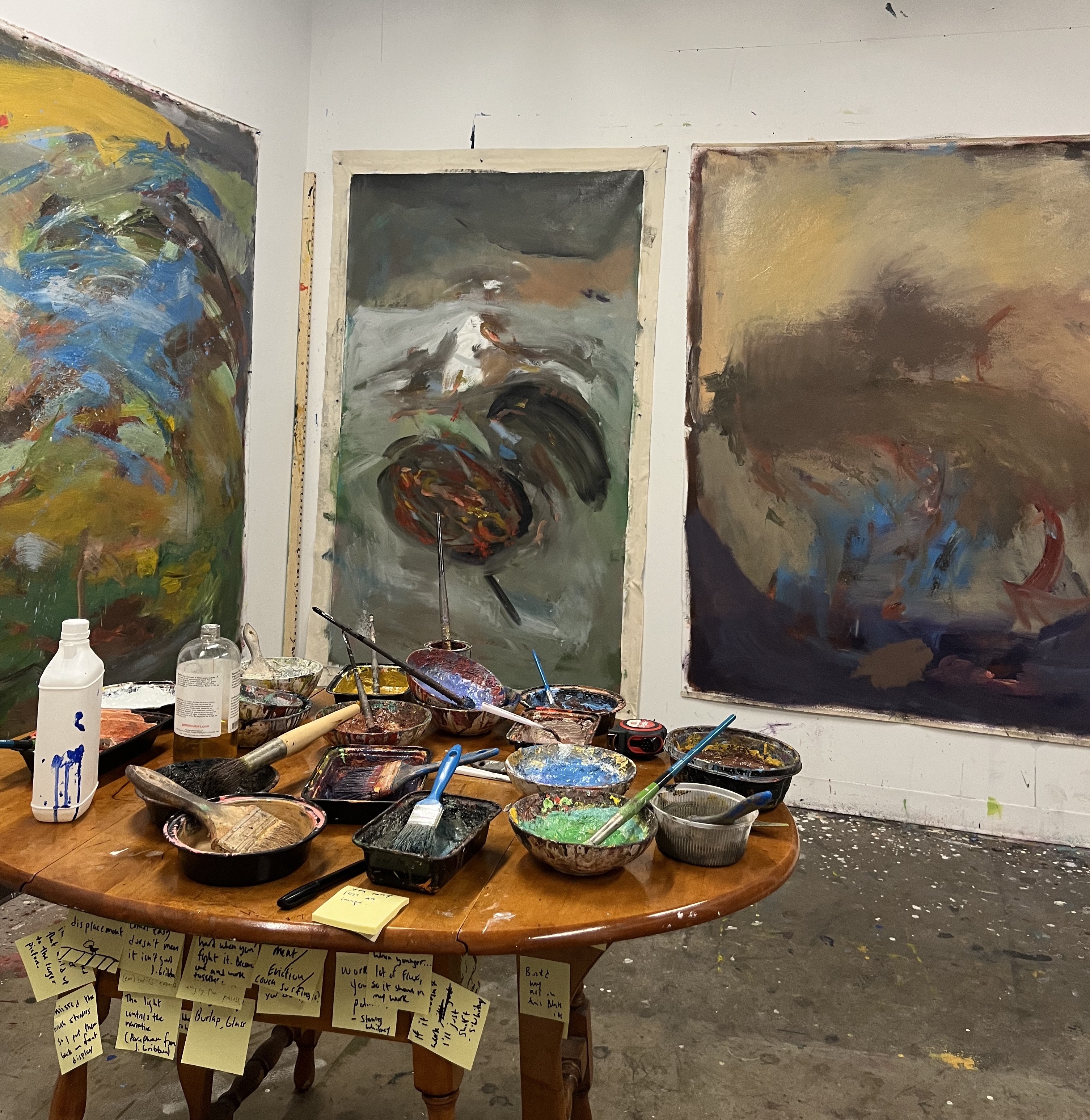
© Demetrius Wilson's Studio. Image: Demetrius Wilson
And last but not least: Could you please tell us a bit about your forthcoming projects and plans? What are you currently working on and what would you like to bring into life one day in the future?
Well, that is still kind of a blur. We are currently talking about some group shows and some solo shows. At the same time, I am still at school. I graduate in spring 2024, and I have to present my final thesis. So, I am not fully out of the door yet. I cannot really do too much. But I am trying to lock down some group shows. And then we have summer, and the summer is the best time for me to be in the studio. I can paint there all day long. So, I am very looking forward to summer, when I don’t have classes and I can be in the studio from sun up to sun down. I have a way more flexibility during the summertime. I actually do not have any crazy reason to be in the studio in summer, I just like painting in the studio and especially in summer. I made a deal in 2015 to make art seriously and I have been fortunate enough to start it blossom as a career. And I just love art! It is like an obsession for me.
Interview conducted by Valentina Plotnikova